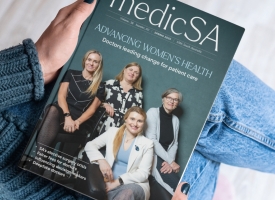Dr Bartone - Health Impacts of Bushfire Smoke
Transcript: AMA President, Dr Tony Bartone, 2GB, Sunday, 12 January 2020
Subject: Health Impacts of Bushfire Smoke
ED PHILLIPS: Now, as this bushfire crisis continues into what is its fourth month and counting, creating smoky conditions across much of the country, we're being told we need to reduce our exposure, as all this smoke can affect our health. Well, to tell us how it can impact our health, and give us a few tips too on how we can prevent all this exposure, we're joined by the President of the Australian Medical Association, Dr Tony Bartone.
Very timely to have you back on our show, Tony, thanks for being with us today.
TONY BARTONE: Good morning, Ed. Good morning to your listeners.
ED PHILLIPS: Alrighty. Smoke wafts in and out, as is its wont, at the mercy of our winds. How does it actually affect us and, unknowingly, we're probably inhaling far more than we realise, aren't we?
TONY BARTONE: Look around us at the moment, and all the major capital cities - Sydney, Canberra, Melbourne - and all the bushfire-affected areas - the normal air quality, the normal vision that we can see, is significantly reduced and even down to as little as maybe a kilometre away. That's because the air is containing significant amounts of not only just smoke and dust particles but also other very, very small particles, less than 2.5 microns in width. That's several times …
ZOE BINGLEY-PULLIN: [Talks over] Wow.
TONY BARTONE: … orders of magnitudes thinner than a strand of hair, and those particles can get down into our lungs and cause inflammation. Now, for the average healthy Australian, they can tolerate, you know, little doses of that, but they might get symptoms such as sniffles or runny nose or itchy eye or a bit of a cough, a bit of congestion, but get out of the smoke-affected area and that usually goes away very quickly.
The concern is that if you have pre-existing respiratory disease, cardiac disease, if you're pregnant, if you're elderly, if you're very young, these very small particles will be very deleterious to your health and can set off an asthma episode, trigger a cardiac event, or significant other issues.
And the other thing that we need to remember is that this is now longer than any time in recent history, in recent memory, the weeks upon weeks of this continual, low-quality, very smoke haze-affected air. And, in a research sense, in a worldwide sense, we still don't have enough literature to know about the long-term effects.
So the message is, really, if you don't need to be out in that smoke-affected air, don't. And if you do, make sure you have access to one of those special masks, not the usual surgical masks, but those P2 or N95 masks which come with specific fitting instructions. They work to a fairly good extent but they're not a permanent safeguard, so again, if you don't need to be out there, don't be out there.
ZOE BINGLEY-PULLIN: Tony, I was very saddened when I heard about that poor 19-year-old girl who died of an asthma attack, and they are linking it in relation to the smoke. I have a five-year-old and it really makes me quite nervous to think her poor little lungs, which obviously cannot filter as easily as an adult, could be exposed over an accumulated time.
What can I do? Do I get her staying inside, well, because obviously I can't get a five-year-old to wear a mask? It's just- they pull it off too quickly. What's some tips for kids to help support this process?
TONY BARTONE: Well, you actually make a number of points there, Zoe. The masks are really not designed for kids- for very small children, apart from the fact that they will try to pull them off.
ZOE BINGLEY-PULLIN: [Talks over] Yeah, they're not tolerant to things like that.
TONY BARTONE: So kids - keep them out of the smoke, keep them indoors. Put your air conditioner on to the recirculate mode if it's got one …
ZOE BINGLEY-PULLIN: [Talks over] Okay, that's a good one.
TONY BARTONE: … you know- and if it's prolonged exposure and you can't really follow those little guidelines, maybe look at trying to get out of the area for a little while. Go to a sister's place, a mother's place, whatever the options that might be available.
Of course, there are long-term practicalities. We have to work, we have to go about our daily lives, so there is going to be a lot of learning out of this current crisis, and no doubt we'll review a lot of our guidelines and a lot of our advisories in the months ahead.
GERALD QUIGLEY: Tony, you mentioned pregnant women, and that obviously is a concern because you've got a developing foetus. Any special precautions they might follow?
TONY BARTONE: Well, you know, Gerald, look, simply just really avoid all unnecessary exposure, and make sure if you do have to go outside, get one of those special masks where you …
GERALD QUIGLEY: [Talks over] Masks.
TONY BARTONE: It's those really fine particles, they not only get down deep into the lungs, further past the usual body's defences in that area, but they can absorb into the bloodstream. That's how they cause the cardiac events. That's how that inflammation leads to other significant secondary effects.
But the other - and I didn't mention this earlier - but there's a group of Australians who are yet to have their first asthma episode, who don't know they have underlying asthma, or have poorly treated asthma. They don't understand their asthma treatment plans, or they don't have a plan to begin with, or they don't implement it as wisely as they should, or, worse still, they might borrow their mate's Ventolin puffer when they get a bit tight in the chest.
ZOE BINGLEY-PULLIN: Yeah.
GERALD QUIGLEY: Sure.
TONY BARTONE: All of those things, really bad and really, see your doctor, get the advice, and make sure that you have your medication and your puffers available at all times.
ZOE BINGLEY-PULLIN: I thought it was a great tip you just put then when it comes to air conditioning, because, I mean, my eyes are really irritated and I don't like sleeping with an air conditioner, so I stupidly have slept with a window open, so now my eyes are quite affected by it. But there are a lot of good-quality air purifiers, and just can you reiterate that again? So you can put your air-conditioning on recycling, and should we also be checking the filters of our air conditioning system, and regularly re-cleaning those as well?
TONY BARTONE: All of those suggestions make a lot of sense. But the purifiers, there's a lot of literature about the usefulness or the limited usefulness.
ZOE BINGLEY-PULLIN: Right, okay.
TONY BARTONE: My advice is to use those purifiers in really small areas. Maybe, you know, the bedroom might be the appropriate place to, you know, a smaller area where you can rely and keep that area to be utilising the effects of that purifier. But yes, it just shows you how the smoke – apart from just the visual quality, how it can impact on our lives so deeply and so profoundly.
ED PHILLIPS: Are our lungs going to bounce back from episodes like this, and prolonged exposure? What do we know?
TONY BARTONE: What we know is that at the end of each bushfire season, the fireys who are on the front line get extensive medicals. So they give us a lot of information about the effects or the capabilities or resilience of human lungs. But we don't have studies worldwide on the effects of prolonged exposure to bushfire smoke. It's different to pollution, it's got a different particulate matter content, so we need to get the actual science.
And I know that there are discussions in the Department of Health at the moment about looking at the long-term effects, and starting the research and collecting the data as we speak to advise us in the years to come, because obviously we've been caught on this occasion. We need to be better prepared next time.
ED PHILLIPS: Alright. Really appreciate your advice, of course, and great to have you on the show again this morning. Thanks Doc.
13 January 2020
CONTACT: John Flannery 02 6270 5477 / 0419 494 761
Maria Hawthorne 02 6270 5478 / 0427 209 753



